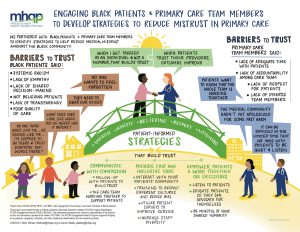A Roadmap to Reduce Medical Mistrust with Black Patients in Primary Care
(May 2025)
 Trust is central to quality healthcare, yet it is a major concern for many Black patients.1 According to data compiled over the past four years through MHQP’s annual statewide Patient Experience Survey, there is a significant disparity in trust between Black and White patients in primary care in Massachusetts. Although trust is the foundation of high-quality healthcare, there is a dearth of research on this subject. Primary care holds a pivotal role in establishing trust, ultimately contributing to enhanced health outcomes and the mitigation of health disparities.
Trust is central to quality healthcare, yet it is a major concern for many Black patients.1 According to data compiled over the past four years through MHQP’s annual statewide Patient Experience Survey, there is a significant disparity in trust between Black and White patients in primary care in Massachusetts. Although trust is the foundation of high-quality healthcare, there is a dearth of research on this subject. Primary care holds a pivotal role in establishing trust, ultimately contributing to enhanced health outcomes and the mitigation of health disparities.
To help direct future research in this area, MHQP partnered with the American Board of Family Medicine (ABFM), Boston Medical Center (BMC), and the Boston Public Health Commission (BPHC) in a project funded through a Patient-Centered Outcomes Research Institute (PCORI) Eugene Washington PCORI Engagement Award (EASCS #35226).* The primary output of this effort is a Roadmap for identifying the best methods to research and reduce medical mistrust among Black patients in primary care.
The project team engaged Black patients and primary care team members—including physicians, physician assistants, nurses, patient navigators, and clinical support staff—through two focus groups and a multi-stakeholder convening conducted in the fall of 2024 and winter of 2025. The perspectives we heard through these meetings highlighted the profound impact of systemic racism on medical mistrust. Factors such as past medical harm, historical injustices, lack of diverse representation among medical staff, and insufficient organizational accountability for addressing past harm all contribute significantly to distrust within Black communities, according to participants.
The illustration above summarizes the results of this effort, offering collaborative strategies for addressing the critical issue of medical mistrust in the Black community.
What We Heard
Here are a few examples of the poignant quotes from participants:
“We as black folks have become so intimidated by somebody that we think knows more than we do about us or our bodies that we just sort of sit there, take it, go somewhere quietly and suffer. That’s what they want us to do. We need to stop.” (Black/African American Patient)
“We just want to be treated like we’re human. We want to be cared for, we want to be heard. We want to know that we matter. It’s stressful just thinking about all the things that we do every day and then on top of this…we have physicians who aren’t listening to us.” (Black/African American Patient)
“…there was nothing else that told me that this man [doctor] could care for me any way, shape, form or fashion unless I dressed up, did the dance for him and performed the way that he felt that I deserved his care. …I was looked at as less than because of the color of my skin. That was the only reason why I was treated so bad.” (Black/African American Patient)
“Knowledge is power. When you don’t have that trust, you can’t impart that knowledge to your patients and they’re not receptive to it…I think we as healthcare professionals have the power to change this discourse and change that level of trust our community has.” (Family Medicine Physician)
“I think trust is built… when [patients] see that we have really good team-based relationships. If [a patient navigator] …is in the community, is trusted and knows me well and trust me, I think that that goes a long way to building [patient’s] trust with the healthcare system and with recommendations” (Internal Medicine Physician)
Strategies for Future Patient-Centered Research
Based on the focus group discussions, the project team identified barriers to trust — from the perspective of both the patient and the primary care clinician — and developed key strategies for reducing medical mistrust.
Acknowledging the persistent challenges in these areas, MHQP and its partners encourage researchers to use the Roadmap as a foundation for future patient-centered research and collaboration. We hope this Roadmap serves as a valuable resource for community organizations and healthcare researchers, guiding the identification, implementation, and expansion of effective strategies to build trust with Black patients.
If you’d like to learn more about the research directions the group identified to address mistrust in healthcare among Black patients, please download the Roadmap HERE.
If you have any questions please contact Molly Totman at mtotman@mhqp.org or Autumn Bailey at abailey@mhqp.org
1. National Academies of Sciences, Engineering, and Medicine. 2021. Implementing High-Quality Primary Care: Rebuilding the Foundation of Health Care. Washington, DC: The National Academies Press. https://doi.org/10.17226/25983.
* This project was funded through a Patient-Centered Outcomes Research Institute (PCORI) Eugene Washington PCORI Engagement Award (EASCS #35226). The statements presented are solely the responsibility of the authors and do not necessarily represent the views of PCORI®. The PCORI Engagement Award Program supports bringing more patients, caregivers, clinicians, and other healthcare stakeholders into the research process.

